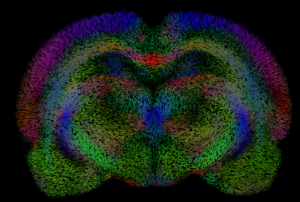
This rendering of the rat brain was created using the Quantitative Imaging Toolkit created by Ryan Cabeen, PhD. (Image/Courtesy USC Mark and Mary Stevens Neuroimaging and Informatics Institute)
(Originally posted at HSC News.)
By Zara Greenbaum
Ryan P. Cabeen, PhD, a postdoctoral researcher in the USC Mark and Mary Stevens Neuroimaging and Informatics Institute (USC Stevens INI) at the Keck School of Medicine of USC, has received an imaging technology grant from the Chan Zuckerberg Initiative (CZI), a philanthropy led by Priscilla Chan, MD, and her husband, Facebook founder Mark Zuckerberg.
The grant, which provides up to five years of funding, will support Cabeen’s ongoing efforts to develop computational tools to make neuroimaging both more powerful and more useful.
“Advances in neuroimaging have taught us a lot in the past few decades, but we still need better tools to refine our understanding of the brain based on the increasing amount of data we are collecting,” said Cabeen, who joined USC Stevens INI in 2016. “My goal is to create computational tools that can solve existing problems for biomedical researchers, help form and test scientific hypotheses, and encourage collaboration across the disciplines.”
The award will provide support for several new and ongoing projects. First, Cabeen aims to create tools that can build a bridge between different types of neuroscientific data, including magnetic resonance imaging, preclinical imaging, and microscopy. He also plans to create large “benchmark” datasets of brain images that can help researchers test the efficacy of image processing tools, and to build an online analytics platform for expertise-guided neuroinformatics, which will support collaboration between neuroimaging researchers and tool developers, starting with a focus on Alzheimer’s disease.
Cabeen will also plan and organize educational programming for neuroimagers, including a workshop series to train biomedical researchers in scientific visualization, computing, analytics, and data management. All of his work will involve close collaboration with researchers via the USC Stevens INI’s two imaging cores: the Center for Image Acquisition (CIA) and the Neuroimaging and Informatics Computing Center (NICC).
CZI’s Imaging program aims to drive breakthroughs in curing, preventing, or managing disease by advancing the imaging field. Cabeen joins a group of 22 preeminent engineers, physicists, mathematicians, computer scientists, and biologists in 11 countries around the world.
“We want to enable researchers everywhere to visualize, measure, and analyze the biological processes underlying health and disease. We’re thrilled to welcome our new imaging grantees,” said CZI Head of Science, Cori Bargmann.
The projects will build on Cabeen’s previous work developing the Quantitative Imaging Toolkit (QIT), a software package of computational tools for the modeling, analysis, and visualization of scientific imaging data. For example, QIT enables researchers to analyze imaging data and render brain models in interactive 3D visualizations, which can aid educational efforts and allow scientists to better understand their data.
“Interestingly, many scientific projects spend far more effort collecting imaging data than they do in extracting information and knowledge from those images. We, at the INI, believe that is sometimes a missed opportunity. The development of ever more sophisticated tools, such as the Quantitative Imaging Toolkit, are critical to fully understanding all that neuroimages have to tell us about the brain,” said Arthur W. Toga, PhD, director of the USC Stevens INI. “We look forward to further expanding these capabilities with support from CZI.”